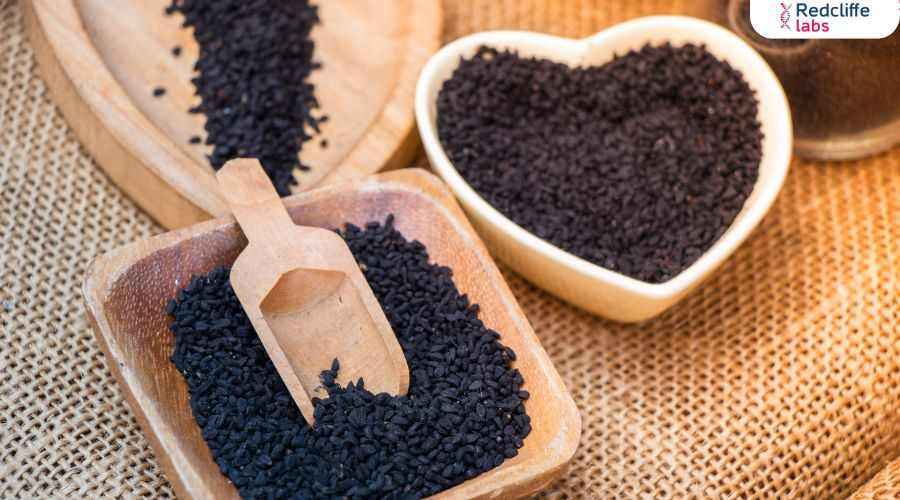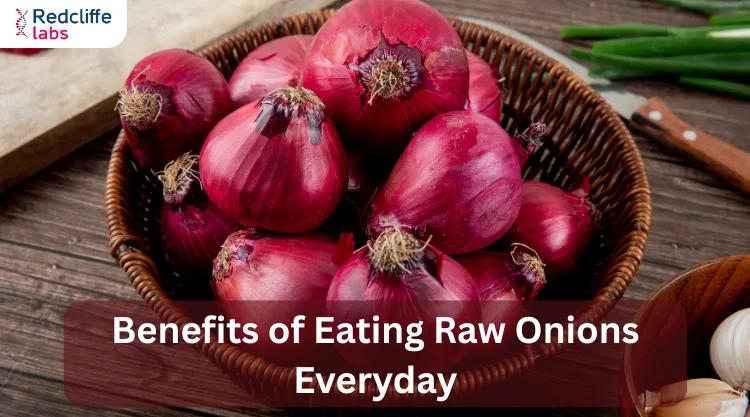Kalonji Seeds Benefits, Side Effects, Dosage, and More!

Medically Reviewed By
Dr. Geetanjali Gupta
Written By Muskan Taneja
on Oct 3, 2024
Last Edit Made By Muskan Taneja
on Jul 19, 2025

The seed market in India is growing impressively for both agriculture and health benefits. In 2024, the Indian seed market reached USD 3.91 billion. Seeds offer various health benefits because they contain vitamins, minerals, healthy fats, fiber, and antioxidants that help control blood sugar levels, blood pressure, and cholesterol.
There are 12 types of seeds popular in India. Kalonji seeds are one among these. Kalonji seeds benefit from overall health improvement. Scientifically known as Nigella Sativa, it is a flowering plant that grows in parts of South and Southwest Asia. Kalonji seeds are beneficial for both culinary and health. Today, let’s understand all about kalonji seeds.
What are Kalonji Seeds?
Kalonji seeds are a small plant that grows widely in southern and eastern Europe, the Middle East, Southwest Asia, and North Africa.
It is popular under several names, such as nigella, black cumin, fennel flower, black caraway, Roman coriander, Habbatul Barakah, and Tikur mud.
Kalonji seeds emerge from the Nigella sativa plant, which can be used for cooking. However, some people apply kalonji oil to their bodies, which provides several health benefits.
Also, read https://redcliffelabs.com/myhealth/web-stories/7-health-benefits-of-pumpkin-seeds/
What Health Benefits Does Kalonji Oil Provide?
Kalonji oil may support overall health because of the thymoquinone (compound) present in it. Thymoquinone is rich in:
- Antioxidants
- Anti-inflammatory
- Antiviral
- Antifungal
- Hepatoprotective
- Analgesic (pain relief)
- Antibacterial
- Antioxidant
- Cytotoxic and anti-cancer
Kalonji oil is commonly available in the market in the form of capsules. These capsules can help aid in:
- Asthma
- Inflammation
- High cholesterol
- Metabolic syndrome
- Chronic obstructive pulmonary disease (COPD)
- Diabetes
- Cancer
- Infertility
- High blood pressure
- Autoimmune disorder
- Neurological disorder
Nutritional Value in Kalonji Seeds
100 grams of Kalonji Seeds are enough to sustain the day and prevent the risks of chronic diseases. Here is the nutritional value of 100 grams of kalonji seeds.
| Nutrition | Amount (per 100 grams) |
| Calories | 375 kcal |
| Protein | 17.81g |
| Total Fat | 22.27g |
| Saturated Fat | 1.5g |
| Monounsaturated Fat | 14.04g |
| Polyunsaturated Fat | 3.27g |
| Carbohydrates | 44.24g |
| Fibre | 10.5g |
| Sugars | 2.25g |
| Sodium | 168 mg |
| Calcium | 931 mg |
| Phosphorus | 499 mg |
| Vitamin A | 64 IU |
| Vitamins C | 7.7 mg |
| Vitamin E | 3.33 mg |
| Vitamin K | 5.4 mg |
| Iron | 66.36 mg |
10 Impressive Health Benefits of Kalonji Seeds
Since ancient times, kalonji seeds have benefited people. These seeds can help boost brain function, improve heart health, and more. Generally, people take around 1.5 grams of kalonji seeds in a day. However, the dose requirement differs from person to person. You should always consult your doctor to know the right amount of kalonji seeds. Kalonji Seeds possess plenty of benefits. These are:
- It can boost brain power.
- It can control diabetes.
- It can reduce inflammation or pain.
- It can control blood pressure.
- It can improve heart health.
- It can relieve asthma.
- It can improve kidney health.
- It aids in weight loss.
- It can reduce headaches.
- It contains anti-cancerous properties.
1. Kalonji Seeds Can Boost Brain Power.
Kalonji seeds enhance brain function and boost memory. Doctors suggest them as a preventive medicine for Alzheimer's.
According to Ayurveda, daily consumption of kalonji seeds may boost memory and concentration, especially in older people. The beneficial compounds in kalonji seeds can protect brain cells from damage.
2. Kalonji Seeds Can Control Diabetes
A study shows that kalonji seeds are beneficial for diabetic people. They can lower or maintain blood sugar levels and improve insulin sensitivity.
Kalonji seeds can be obtained by blending kalonji oil with black tea. This can help balance blood sugar levels. Diabetic people can also opt for kalonji seeds; however, consult your doctor before.
3. Kalonji Seeds can Reduce Inflammation or Pain.
Kalonji seeds contain anti-inflammatory properties that can help reduce inflammation or pain. Thymoquinone, an active compound in kalonji oil, helps relieve inflammation.
Studies have shown that kalonji seeds can prevent life-threatening diseases like arthritis or asthma.
4. Kalonji Seeds can Control Blood Pressure.
Studies show that kalonji seeds can help maintain blood pressure. They help relax blood vessels and improve blood circulation, which lowers blood pressure.
Kalonji seeds benefit immensely when their oil is consumed in warm beverages. It is also an ancient method of controlling blood pressure levels.
5. Kalonji Seeds can Improve Heart Health.
The antibacterial, antioxidant, and anti-inflammatory properties of kalonji seeds can help improve overall heart health.
Kalonji oil can reduce bad (LDL) cholesterol and triglycerides, reducing the risks of heart ailments.
Adding kalonji seeds to your diet can help increase blood circulation and lower the risks of heart attacks.
6. Kalonji Seeds can Relieve Asthma.
In ancient times, kalonji seeds were used to relieve health issues like Asthma. Their anti-inflammatory properties helped relieve Asthma.
The seeds can relax airways and limit the risks of asthma attacks. Additionally, consuming kalonji seeds may reduce respiratory problems.
7. Kalonji Seeds Benefits for Weight Loss
Seeds can help boost metabolism and contain properties that can curb cravings. This may benefit weight loss.
If you are dieting or wish to lose weight, add kalonji oil to warm water and drink it. It can help with weight loss. Also, consult your doctor before using it.
8. Kalonji Seeds can Reduce Headaches.
Headaches are common, and we often neglect them. These headaches might later turn into migraines. Apply kalonji oil on your forehead, which provides relief for your head.
Also, the anti-inflammatory properties in kalonji seeds reduce the frequency and recurring headaches.
9. Kalonji Seeds contain Anti-cancerous Properties.
Thymoquinone is an effective component in kalonji seeds. It has anti-inflammatory, antioxidant, and anti-cancerous properties.
Kalonji seeds' anti-cancerous properties may prevent the growth of cancerous cells and protect against any particular type of cancer.
10. Kalonji Seeds Can Improve Kidney Health.
Studies show that kalonji seeds can improve kidney health. The anti-inflammatory and antioxidant properties can promote kidney functioning and prevent the chances of kidney stones.
The properties, compounds, and nutrients in kalonji seeds help flush out toxins from the body and improve overall kidney health.
Recommended Dosage of Kalonji Seeds
Kalonji seeds have been known since ancient times. Since then, Ayurveda has described a daily dosage amount of kalonji seeds.
| Conditions | Recommended Dosage |
| Children | 15 mg per Kg of body weight. |
| Adults | 1 to 3g |
| During Pregnancy | Not Recommended |
| Lactation | 1 to 3g |
| Geriatric Dosage | 1g |
| Max. Dosage | 6g per day in separate doses |
| Type | Daily Dosage |
| Kalonji Powder | ¼- ½ teaspoon in a day. |
| Kalonji Capsule | 1-2 capsules twice in a day. |
| Kalonji Oil | ¼-½ teaspoon once or twice a day. |
6 Side Effects of Kalonji Seeds!
The dosage differs from age to age. Without proper guidance, it may provide side effects or reactions. Here are 6 potential side effects of Kalonji seeds if taken excessively.
- Kalonji seeds can lower blood sugar levels, especially in diabetic people. They may face severe health problems.
- It may form a situation of hypotension, which can lower blood pressure. You may have symptoms such as fatigue, fainting, and weakness.
- It might trigger gastrointestinal discomfort such as gas, bloating, stomach aches, and diarrhea.
- It might increase the risk of bleeding, especially during surgical procedures.
- It might trigger skin allergic reactions such as itching, redness, or rashes.
- Kalonji contains blood-thinning properties that can increase the risk of nosebleeding.
Key Takeaways
Kalonji seeds benefit overall health because of their compounds and nutrition. Thymoquinone is an antioxidant that is mostly known for several kalonji seed benefits. Remember, you should consume kalonji seeds in moderate amounts, as excessive amounts can increase the risk of digestive issues, allergic reactions, and high or low blood pressure. You should know if you are allergic to kalonji seeds before consuming them.
Redcliffe Labs offers a Food Allergy Panel Test, which can help you detect any type of food allergy. Their skilled and professional team of lab technicians and phlebotomists helps in the seamless execution of tests. Also, their DMLT-certified phlebotomist will visit your home to collect the blood sample, making it convenient and accessible. Simply book the test and check for food-allergic agents causing you trouble.
Leave a comment
4 Comments
Marilyn
Apr 5, 2025 at 7:15 AM.
Do kalonji seeds have a life span. I bought some 3years back, would they still be recommended for use?
Myhealth Team
Apr 7, 2025 at 6:15 AM.
Yes, kalonji seeds (nigella seeds) do have a shelf life, usually around 2 to 3 years if stored in a cool, dry, airtight container away from sunlight. After 3 years, they may lose potency, aroma, and medicinal properties, though they might not be harmful. If the seeds smell stale or taste off, it's better to avoid using them and buy a fresh batch for best results.
Jackie Lamantia
Feb 28, 2025 at 12:49 AM.
Are Kalonji seeds and Black Seed oil the same
Myhealth Team
Mar 7, 2025 at 5:57 AM.
Yes, Kalonji seeds and Black Seed oil come from the same plant, Nigella sativa. Kalonji refers to the whole seeds, while Black Seed oil is extracted from these seeds. Both offer similar health benefits, including anti-inflammatory and antioxidant properties.
Ganga Nath Thakur
Jan 27, 2025 at 4:04 AM.
I want to use mangrela for benifits of constipation
Myhealth Team
Jan 28, 2025 at 6:03 PM.
Mangrela (Mango Ginger) can help relieve constipation by improving digestion and bowel movements. Use it raw, as a powder mixed with water, or in juice form. Consult a doctor before use to avoid side effects.
Gautam kumar ghosh
Jan 24, 2025 at 5:53 PM.
I am interested in knowing the benefits of kalonji
Myhealth Team
Jan 30, 2025 at 12:09 PM.
Hi, Requesting you to please read our blog we have covered several things on the benefits of Kalonji seeds.



